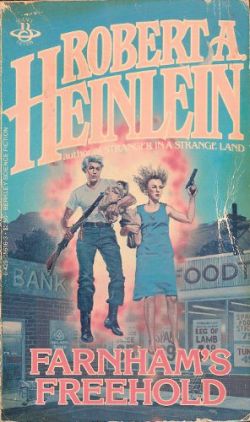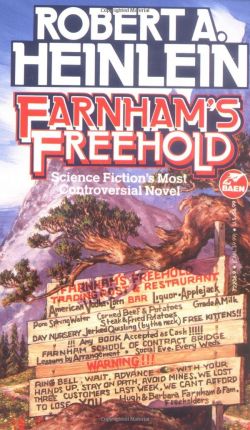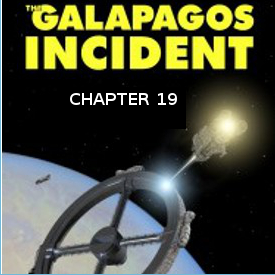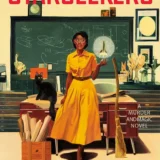 When I was younger, someone – my grandmother, I think – told me how to determine if something was ‘fair’ or ‘nice.’ Would I like it if someone did it to me? Flip it around, have someone do it to me … and see if I still like it. And it was not a bad approach to take, neither for a preteen boy nor adults. Being unpleasant to someone – anyone – is a great deal less funny if someone does it to you.
When I was younger, someone – my grandmother, I think – told me how to determine if something was ‘fair’ or ‘nice.’ Would I like it if someone did it to me? Flip it around, have someone do it to me … and see if I still like it. And it was not a bad approach to take, neither for a preteen boy nor adults. Being unpleasant to someone – anyone – is a great deal less funny if someone does it to you.
This is the basic idea behind ‘flipping’ books. Take a concept – racism, sexism, religious discrimination – and turn it on its head. The victimiser – who often doesn’t see himself as the victimiser – is now the victim, while the former victims are now the victimisers. These books are rarely pleasant, not for either side; the former victims realise, to their horror, just how unpleasant it is to be on the receiving edge of such treatment, while the victimisers recoil in horror at the thought of becoming just as bad as their tormentors. (Or occasionally revel in it.)
It is a very challenging field to write in, even today. Roald Dahl’s The Magic Finger is perhaps the best flipping book I’ve read, with a family of hunters suddenly turned into birds and hunted by walking birds. Naomi Alderman’s The Power is more for adults, showing us a world where women are suddenly the stronger gender … but also exaggerating a number of points which make it harder to take the book seriously. (As a particularly cynical reviewer put it, men become bad parodies of women and vice versa.) And other books – Revealing Eden, for example – draw a great deal of controversy by their very nature. The author was accused of being a racist and, while these days I have a habit of discounting all such claims on general principles, I have to agree she isn’t the most capable of authors.
But Heinlein, by contrast, was a very skilled author when he turned his hand to Farnham’s Freehold. And that makes the book, in many ways, all the more perplexing. There is no question that is was, and remains, a highly controversial book. As a serious story, it is deeply flawed; as satire, it doesn’t always make its points clearly enough for the average reader. It’s easy to call it a racist book, even though Heinlein was holding a mirror up to the hypocrisies on both sides of the Civil Rights Era. Indeed, I cannot help but wonder if there aren’t two separate plotlines in the story, clumsily combined. But, as I noted before, Heinlein faced many more restrictions on what he could and couldn’t write about. Putting them together might have been the only way to get the true point past the gatekeepers.
 Farnham’s Freehold revolves around Hugh Farnham, who considers himself a rugged individualist, survivalist and old-fashioned family patriarch (and pretty much everyone else considers something of a jerk) and his family: Grace, his drunkard wife; Duke, his mommy’s boy son; Karen, his pregnant college-student daughter; Barbara, Karen’s friend and Joe, the family’s black houseboy (who also happens to be an accounting student). Hugh has made himself a laughing stock in the community by preparing for a nuclear attack, but he gets the last laugh when the missiles actually start to fly in the midst of a game of bridge. Declaring himself to be the captain of the ship(wreck), Farnham hurries everyone down to the bomb shelter and, in the middle of the night, seduces and impregnates Barbara.
Farnham’s Freehold revolves around Hugh Farnham, who considers himself a rugged individualist, survivalist and old-fashioned family patriarch (and pretty much everyone else considers something of a jerk) and his family: Grace, his drunkard wife; Duke, his mommy’s boy son; Karen, his pregnant college-student daughter; Barbara, Karen’s friend and Joe, the family’s black houseboy (who also happens to be an accounting student). Hugh has made himself a laughing stock in the community by preparing for a nuclear attack, but he gets the last laugh when the missiles actually start to fly in the midst of a game of bridge. Declaring himself to be the captain of the ship(wreck), Farnham hurries everyone down to the bomb shelter and, in the middle of the night, seduces and impregnates Barbara.
When they emerge, they find themselves apparently alone, but safe (which should have been a immediate giveaway that something other than nuclear attack happened). Hugh promptly starts turning his house into a farm so they can live, despite successive personality clashes and a deadly tragedy when Karen dies in childbirth. They are on the brink of tearing themselves apart when they are discovered, captured and enslaved by the local rulers, who just happen to be black. Whites are slaves, nothing more. The nuclear war was thousands of years ago, they discover, and when the north destroyed itself the (black) south eventually took over the world.
Hugh, to his horror, finds slavery unendurable to a free man. His family (save for Barbara and her newborn twins) don’t agree. Grace is happy to be a pampered pet; Duke is willing to be castrated, just so his position in the slave household is secure. (It says a great deal about Joe’s character that he doesn’t take (much) advantage of the opportunity to lord it over Hugh Farnham and his family, even when elevated to a position of power by the mere colour of his skin.) Hugh eventually comes up with an escape plan, which fails miserably … but, luckily for him, his new master is willing to send them back in time via an experimental time travel device. They find themselves back home on the night of the bombings and run to another of Farnham’s properties, where they plan to survive at all costs … IN FARNHAM’S FREEHOLD, their sign says, FARNHAM RULES.
Oh, boy.
The book is, essentially, divided into two sections. The first, the post-war survivalist section, is probably the best part of the book (although, because of the time travel, Farnham and his family avoid many of the problems of post-nuclear-war worlds). Heinlein touches on many aspects of survival that are worth studying, from the sudden loss of mail order services to the dangers of surviving in a primitive world. And government, asking how the post-war society should govern itself. There are a lot of good points here, as well as some weaker ones. Heinlein neatly debunks some survivalist claims – they’ll be king of the hill after the war – by making it clear that survival post-war will be no bed of roses.
 The second section represents such a surprising shift that I believe some readers wondered if Heinlein got bored of the first section. (Although it might have been intended to distract people who would be horrified at the mere idea of whites being enslaved.) It is very effective – give Heinlein credit for that, at least – at getting across the idea of just how horrible and dehumanising slavery is, particularly to those who know no better life. Heinlein touches on the slave mindset, a form of Stockholm Syndrome where slaves tell themselves that they really run the place, then knocks it aside by making it clear that the slaves depend on their masters. Indeed, the rulers who are sure of their own benevolence are worse than the ones who merely treat the slaves as animals. There are resonances here that our modern society should carefully note. The simple fact that Hugh failed to escape merely underlines the nightmarish trap slavery represents for its victims. Farnham, in a manner of speaking, is the Heinlein hero who fails.
The second section represents such a surprising shift that I believe some readers wondered if Heinlein got bored of the first section. (Although it might have been intended to distract people who would be horrified at the mere idea of whites being enslaved.) It is very effective – give Heinlein credit for that, at least – at getting across the idea of just how horrible and dehumanising slavery is, particularly to those who know no better life. Heinlein touches on the slave mindset, a form of Stockholm Syndrome where slaves tell themselves that they really run the place, then knocks it aside by making it clear that the slaves depend on their masters. Indeed, the rulers who are sure of their own benevolence are worse than the ones who merely treat the slaves as animals. There are resonances here that our modern society should carefully note. The simple fact that Hugh failed to escape merely underlines the nightmarish trap slavery represents for its victims. Farnham, in a manner of speaking, is the Heinlein hero who fails.
Heinlein was not, I think, blind to the fact that Hugh is severely unlikable. He has all the vices of Heinlein’s older patriarch characters (Doctor Ira Johnston or Jubal Harshaw, for example) but without the virtues. He’s a toweringly dictatorial figure who alternatively tries to cajole or threaten his son into doing what he says (at one point, threatening to kill Duke outright.) It’s easy to see why Grace has sought refuge in a bottle, although harder to understand why Farnham didn’t try to stop her. (Did he want her to remain in an alcoholic haze? On the other hand, he admits himself that nothing short of physical force would stop her.) I think, in many ways, he’s a deliberate drawing of a failed Heinlein hero. Duke, by contrast, is a weak little boy in an adult’s body, trying endlessly to assert himself against his father, but lacking the power and self-confidence to make it work. Karen, meanwhile, has become pregnant out of wedlock, perhaps unsurprising when we remember that her father committed adultery and sired two children out of wedlock himself. Joe and Barbara, the outsiders, are only marginally better people. Barbara seems to become ultra-submissive as soon as Hugh beds her, while Joe hides his resentments under a bland exterior.
It’s fairly obvious that most of the family’s pre-war problems can be traced back to their patriarch. Hugh lacks the essential fathering skill of training one’s son for life and independence while avoiding permanent dependency. His one code is survival, which (ironically) is embraced by both Grace and Duke when they are enslaved. They did what they had to do to survive. Hugh is also incapable of forming a partnership with anyone, even his wife. He lacks even basic respect for Grace, to the point where he seduces Barbara (a girl the same age as his daughter) while his wife is sleeping. I can’t help, but wonder if Hugh’s hysterics upon learning that Duke is all right with being castrated stems from a sudden realisation that Duke’s behaviour is all Hugh’s fault.
And I wonder if this was deliberate on Heinlein’s part. It is difficult to like Farnham, to the point where it’s almost a pleasure to watch him be enslaved and repeatedly humiliated. But does Farnham deserve it?
 Such a question has an uneasy resonance in what I call the slave lie, the claim (somehow, never tested) that slaves – particularly blacks – were happier being slaves. The slaveholders of Dixie told themselves (and everyone who would listen) that enslaving blacks was practically a duty, because blacks were better off slaves. They were uncivilised (and blamed for historical problems, through the ‘Curse of Ham’). Indeed, slave traders normally bought black slaves off other blacks, who were happy to send their rivals a very long way away. The flaws within the Farnham Family find uneasy reflection in the post-war world Heinlein shows us, where white civilisation destroyed itself and Farnham himself is largely an ass. Do we really want this guy running around making a fool of himself?
Such a question has an uneasy resonance in what I call the slave lie, the claim (somehow, never tested) that slaves – particularly blacks – were happier being slaves. The slaveholders of Dixie told themselves (and everyone who would listen) that enslaving blacks was practically a duty, because blacks were better off slaves. They were uncivilised (and blamed for historical problems, through the ‘Curse of Ham’). Indeed, slave traders normally bought black slaves off other blacks, who were happy to send their rivals a very long way away. The flaws within the Farnham Family find uneasy reflection in the post-war world Heinlein shows us, where white civilisation destroyed itself and Farnham himself is largely an ass. Do we really want this guy running around making a fool of himself?
Indeed, for all his bragging about survival and rugged individualism, Farnham does very little for himself. He does build a bomb shelter, true, but what else? He is incapable of building a sustainable community (although it’s questionable if anyone would have succeeded, with such a tiny number of people) and he gets captured without a fight. And then … his escape plan is fundamentally flawed. Farnham does not escape through his own efforts, but effectively being manumitted by his new master. (And sending him in the time machine with no guarantee of getting out alive may not have been particularly generous.) Just as Uncle Tom did not own his cabin, Farnham’s fate is out of his hands. And he hates it.
That said, Farnham does have his moments. He understands that frustrations must be let out, rather than left to fester (a point that many people today could stand to learn.) He’s smart enough to realise that the post-war world no longer has room for petty racism (although he still thinks of himself as being in charge). He’s fast to elevate Joe to a position of near-equality, insofar as he considers anyone equal to him. (I sometimes had the impression that Farnham would have preferred Joe for a son, rather than Duke.) Like many other Heinlein characters, Farnham wears the chains of his society … but, unlike others, he’s better than casting them off. His realism leads him to confess to Karen that he would never have advised her to marry a black man back home, as such a relationship would be very difficult, but he has no objections to her marrying Joe in the post-war world. It reads poorly today, yet it would have been good advice in the sixties.
Indeed, both Duke and Grace (and to some extent Barbara) are more openly racist than Farnham. (If nothing else, Heinlein actually makes one take the concept of microaggressions seriously). Duke rages against Joe for backing up Farnham (unsurprisingly, he doesn’t seem to see Joe as responsible for his own behaviour) and draws a sharp line between ‘Negros’ and ‘n*****s’ based on behaviour, while stating that black men are all rapists and other racial stereotypes. It takes a lot to make Farnham look good, but Duke manages it. By contrast, Grace is unwilling to see Joe as anything other than a servant until Farnham manages to beat common sense into her head. They may no longer wear the chains of their society … but nor does Joe!
Joe himself isn’t quite a background character, but he does seem – at first – to be Farnham’s servant. The first signs that he’s becoming more assertive are subtle, yet burst into fruit as the book races towards its denouncement. Joe is tempted by the prospect of being powerful because of the colour of his skin, and the chance to actually make use of his intelligence, and who can blame him for falling? In some ways, Joe’s fall is far more chilling than either Duke or Grace’s because it’s so casually understated. It isn’t until Farnham tries to call him out on this (and his willingness to take Duke and Grace as slaves of his own) that Joe coolly rubs Farnham’s face in his own hypocrisy:
 “Joe, do you know what you sound like? Like some white-supremacy apologist telling how well off the darkies used to be, a-sittin’ outside their cabins, a-strummin’ their banjoes, and singin’ spirituals.”
“Joe, do you know what you sound like? Like some white-supremacy apologist telling how well off the darkies used to be, a-sittin’ outside their cabins, a-strummin’ their banjoes, and singin’ spirituals.”
Joe blinked. “I could resent that.”
Hugh Farnham was angry and feeling reckless. “Go ahead and resent it! I can’t stop you. You’re a Chosen, I’m a servant. Can I fetch your white sheet for you, Massah? What time does the Klan meet?”
“Shut up!”
Hugh Farnham shut up. Joe went on quietly, “I won’t bandy words with you. I suppose it does look that way to you. If so, do you expect me to weep? The shoe is on the other foot, that’s all—and high time. I used to be a servant, now I’m a respected businessman—with a good chance of becoming a nephew by marriage of some noble family. Do you think I would swap back, even if I could? For Duke? Not for anybody, I’m no hypocrite. I was a servant, now you are one. What are you beefing about?”
“Joe, you were a decently treated employee. You were not a slave.”
The younger man’s eyes suddenly became opaque and his features took on an ebony hardness Hugh had never seen in him before. “Hugh,” he said softly, “have you ever made a bus trip through Alabama? As a ‘nigger’?”
“No.”
“Then shut up. You don’t know what you are talking about.”
It is, in many ways, the true core of the story. Farnham understands – he finally understands – what life is life on the other side. It’s a moment of insight that his former self probably could not have had, a dark night of the soul moment that almost makes up for the book’s many problems. He wants to think he’s better than the slaves, that the only think they have in common is skin colour, but is he? Who knows? Maybe the older and wiser Farnham founded a post-war community where men and women were judged by their characters, rather than the colour of their skin. It’s a nice thought, but sadly discredited by the end of the book.
There has grown up, in the past two decades, a notion that it is better to look good than to be good. Or that whoever says something is more important than what they say. Books that have a strong antislavery or anti-racism message have been attacked, on the grounds they use racist language. Uncle Tom’s Cabin and Huckleberry Finn cannot, by any reasonable standard, be deemed racist. And yet, they are attacked because they dare to use the n-word … instead of being praised for spreading an anti-racism message. The belief that appearance trumps reality is one that can only be embraced by a society that is truly soft, while the refusal to ask certain questions only comes across as hiding from the truth (and gives credence to lies, which really need to be brought into the light and coolly debunked). Farnham’s grim observation that Grace was a wonderful person, when she was young and poor and facing adversity that would be unimaginable to any of us, might equally be true of our society.
So too might his wry observation on Duke’s press for democracy … Duke wants power, a veto over the boss, but not responsibility. Nor does he want to convince others to follow him, even when Farnham offers him the chance to do just that. And Duke wants to exclude everyone who doesn’t meet his standards (Joe, for example), which is the exact opposite of democracy. Heinlein had a habit of asking questions that needed answers, questions that – today – we are told we shouldn’t ask. The cynic in me says this explains Donald Trump.
 Farnham’s Freehold is not a nice book (and I can’t help, but wonder if there is deliberate irony in comparing the title to Uncle Tom’s Cabin). And yet, it manages to make its point – and do it, as I have said before, in a time when even Heinlein couldn’t challenge social orthodoxies too openly. The charge that Heinlein was a racist – and that Farnham’s Freehold is a racist book – simply doesn’t stand up to dispassionate analysis. Heinlein was far more sensitive to the problems facing black Americans (small and large) than many other writers of his time. Perhaps we are not meant to like Farnham, but to see in him (and his family) the very worst of his time.
Farnham’s Freehold is not a nice book (and I can’t help, but wonder if there is deliberate irony in comparing the title to Uncle Tom’s Cabin). And yet, it manages to make its point – and do it, as I have said before, in a time when even Heinlein couldn’t challenge social orthodoxies too openly. The charge that Heinlein was a racist – and that Farnham’s Freehold is a racist book – simply doesn’t stand up to dispassionate analysis. Heinlein was far more sensitive to the problems facing black Americans (small and large) than many other writers of his time. Perhaps we are not meant to like Farnham, but to see in him (and his family) the very worst of his time.
Perhaps, also, we are meant to see a danger we face today, yet refuse to acknowledge. We must find a way to live together, instead of trying to drive everyone who disagrees with us out of the community (or destroy them outright). The inherent risk in fighting a war of extermination is that you might lose. Identity politics carry with them the seed of dislike, disdain, hatred and eventually war. If we are divided into groups, instead of accepting our common humanity, why should someone from the first group help the second? Why should he go out on a limb for someone when that person is busy sawing the limb off behind him?
Or, put rather more crudely, the ass you kick on the way up may be the one you have to kiss when you’re on the way back down.
It is a controversial book Make no mistake. It is very controversial. But it is well worth a read. And besides, if you want to condemn Heinlein, you’ll have to condemn many others too.
And tell me – if you want to condemn Heinlein for racism on spurious grounds – how would you feel if someone did it to you?









